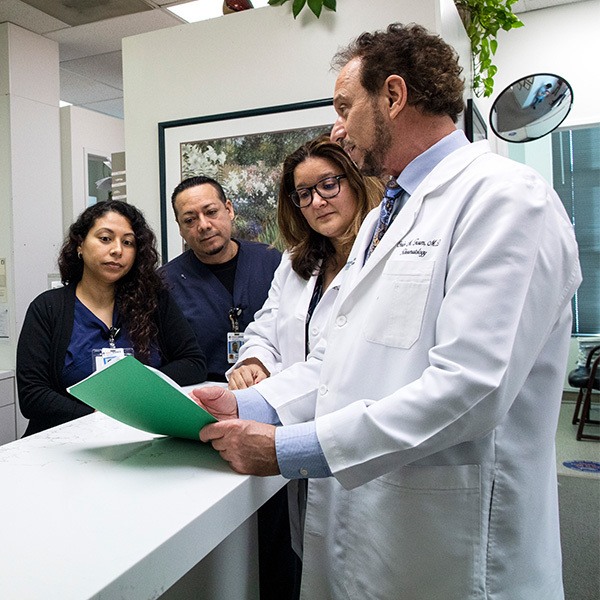Psoriatic Arthritis

Overview
What is Psoriatic Arthritis?
Psoriatic arthritis is a form of inflammatory arthritis that occurs in some patients with psoriasis, an inflammatory skin condition that causes itchy red patches on the skin. Psoriatic arthritis can affect different joints in the body, including the fingers and toes, and sometimes the back and sacroiliac joints of the pelvis. Joint damage can occur in people with severe psoriatic arthritis if it is left untreated. Fortunately, treatment can protect the joints and relieve pain while preserving mobility. Approximately one third of patients with psoriasis develop psoriatic arthritis.
Symptoms
Symptoms of Psoriatic Arthritis
People with psoriatic arthritis usually develop psoriasis first, a condition characterized by inflamed red patches of skin with silvery scales. They may go on to develop painful, stiff and/or swollen joints, particularly in the fingers and toes. Inflammation can also affect the spine, the tendons, and the bursas leading to pain in the affected areas. Examples are pain caused by tennis elbow, Achilles tendon pain and/or swelling, and plantar fasciitis pain. Flare-ups may be tempered by periods of remission.
Diagnosis
Diagnosis of Psoriatic Arthritis
To diagnose psoriatic arthritis, a rheumatologist will perform a physical examination to detect certain patterns of arthritis, such as painful or swollen joints, and skin or nail changes that accompany psoriasis. Blood tests may be ordered to rule out other types of arthritis.

Treatments
Treatments of Psoriatic Arthritis
Medications are the treatment of choice for psoriatic arthritis, and there are several classifications of prescriptions used depending on the affected areas and severity of the condition. People with mild symptoms may only require treatment when they are symptomatic. Non-steroidal anti-inflammatory drugs such as ibuprofen (Motrin or Advil) or naproxen (Aleve) can be used as initial treatment. If symptoms persist, disease modifying anti-rheumatic drugs, biologics (which are administered via infusion or injection), JAK inhibitors or PDE4 inhibitors may be prescribed. These medications work by blocking different proteins that cause inflammation and they aim to help control the immune system response.

Trials
Clinical Trials
The rheumatologists at Saint John’s Physician Partners have been integrally involved in the development of medications that treat inflammatory arthritis conditions for decades. They were involved in the clinical trials that led to the approval at the Food and Drug Administration (FDA) for medications that treat rheumatoid arthritis (RA), psoriatic arthritis (PsA), ankylosing spondylitis (SpA), osteoarthritis, and other bone and skin conditions like osteoporosis and psoriasis advanced therapies, some of which are biologic treatments.

Specialists
Psoriatic Arthritis Specialists
Orrin Troum, M.D. and Amro Elbalkhi, M.D. provide consultation, diagnosis, and treatment for rheumatic diseases including inflammatory arthritis (rheumatoid arthritis, psoriatic arthritis, ankylosing spondylitis), scleroderma, myositis, gout, lupus, osteoarthritis, and osteoporosis. The Medical Doctors of Saint Johns strive to provide world class care and a personalized treatment plan for all patients and their families.


